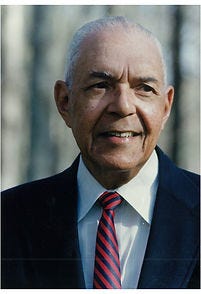[Introduction: Normally, I settle upon an essay idea and away I go! This evening was different. You see, so many ideas were swirling around in my mind throughout the day. I observed black actors in every You Tube podcast I watched about quantum physics. Are 100% of physicists black? The answer is, no. Are 50% of physicists black? Surely, there must be some nexus between the world of physicists and the portrayal of physicists on the screen? To my frustration, there is no entanglement between the world I observed in You Tube and the real world where only 3% of physicists are black. So, absent manipulation, one out of every thirty-three physicists should have been in You Tube advertisements and commercials. The distortion of reality annoyed me.
Then, my thoughts turned to the nascent delineation movement pitting Native Black Americans for generations against black immigrants from the islands, Africa and Europe. Lesser minds see a better argument for reparations for American slavery by emphasizing the slave in one’s background. The Folly of So-Called Foundational Black Americans I reached out to Dan and Jen for their advice. Should I wade in yet again on these minor quibbles of racial identity? It is all strange as I do not live in race consciousness at all. My retirement from Blackness gives me pause sometimes. Am I writing out of pure emotional intensity in the moment or should I sleep on things? I never heard back from Dan and Jen which is just as well. I have the distant memory of blackness lodged in my abnormally large hippocampus/smile. They do not.
Then, I thought I would fall into all that is positive in the world. Why not write something uplifting this evening? I was poised to share the latest AI scary developments but the tone I wanted to leave with you this evening was not dread but something more, more close to my memory as a child. That angle seemed more fitting this evening. So, I was this close, this close, to writing an essay about The Curious Anne-Laure (Redux). There is something Zen about discovering a kindred spirit who lives in curiosity.
Boy, there is something powerful about observing someone else curious, open and experimental. And the nice French accent doesn’t hurt either/smile.
Minutes from penning another essay about the curious Anne-Laure, the idea for this evening’s essay came to me in a flash of insight. I should write about how it felt to think of Blackness as a child. Outside of my family, who defined Blackness for me in the early 1970s? And so walk with me this evening as I share a man’s life. Oftentimes, we get race wrong because we are told one can never know what it is like, what it means to be black.
Allow me to be a child again as I channel the curious Anne-Laure.]
=========
Dr. William Ferguson Reid (1925 - )
If there are over 40 million black Americans, there are over 40 million stories, experiences and perspectives. I should also add over 40 million unique genomes as well. People, we are all unique individuals, everyone of us. Think of Blackness as a happenstance of place and time.
Because of my emotionally intense personality, I assume people recognize relentless recycling of race riots in Tulsa, Oklahoma distort American history like a fun house of mirrors. I become annoyed when otherwise intelligent readers and writers are unaware of beautiful generations of black enterprise in places like Durham, North Carolina; Harlem, New York City; and Jackson Ward, Richmond, Virginia. I knew of Jackson Ward, so the historical ignorance hits home for me.
Growing up as a kid in the suburb of Chester, Virginia and attending schools that were 92% to 95% white while living in an all-black neighborhood and attending an all-black family church, I felt entanglement with the black professional people in Jackson Ward growing up. Jackson Ward was the site of bustling law firms, doctor offices, dentist offices, a black newspaper and a black bank where we banked, Consolidated Bank and Trust founded by Maggie Walker. We banked at Consolidated Bank since my Dad was a Race Man.
As I learned about politics in Virginia in the early 1970s and my Dad railed against the Byrd political machine, one Dr. William Ferguson Reid caught my eye as an example of a good man, a good example to follow.
=========
The son of a dentist, Dr. Leon Reid and his wife, William Ferguson Reid grew up in Jackson Ward surrounded by black lawyers, doctors, dentists and entrepreneurs. In fact, his next door neighbor was none other than Maggie Walker herself, the President of Consolidated Bank and Trust. These were serious people of aim and enterprise in the late 1920s and early 1930s. The spirit in that neighborhood was my inherited conception of Blackness, of what it meant to be a Black American. Not Blackness is Oppression, Nothing Else Matters but a good life as practicing medicine, practicing dentistry, practicing law, practicing banking, practicing journalism.
Why have our children lost this memory of all that was good and ambitious and triumphant in Jackson Ward and American history?
I knew nothing of a Tulsa race riot until, maybe, college….
Reid remembers that his house had the same street address as Maggie Walker’s home. The same address sometimes caused confusion as was the case when a man with a goatee came to the Reid’s door looking for President Walker. The lost gentlemen was Dr. W. E. B. DuBois.
Reid attended Armstrong High School like my cousin, C. I never knew Armstrong as it was a city school and I was a county kid.
After high school graduation in 1941, Reid graduated from Virginia Union University in 1946 and Howard University Medical School. Reid became a surgeon and worked at various hospitals throughout Richmond during his medical career.
=========
As a kid in the early 1970s, I was rooting for more black people to hold political office in the City of Richmond. It seemed to me a matter of simple justice that a half-black city should have black public office holders. What I loved about Dr. Reid was his civic vision. In 1956, Dr. Reid and other black citizens formed a visionary group called the Richmond Crusade for Voters. The idea was to register black voters, strategically encourage black candidates to run for public office and lend endorsements to favored candidates who were vetted. The group met in tactical sessions at a black hotel in Jackson Ward. Black Enterprise in Action, Man! A prominent black surgeon plotting black political strategy at a black hotel to run black candidates for political office in the former Capitol of the Confederacy.
So, you see, at the age of ten, when I thought of Blackness outside of family and church, I thought of Dr. Reid and other black professionals summoning the coming of a better time. A reader once said I am of a by gone black culture. I agree with the reader.
=========
Dr. William Ferguson Reid won election to the House of Delegates in the Virginia General Assembly in 1967. As he was sworn in in January 1968, Reid became the first black member of the General Assembly since Reconstruction. Reid was my Julian Bond, my Andrew Young. Delegate Reid was defeated by the colorful trial attorney Howard Carwile in 1973. Funny thing, I will always remember the name William Ferguson Reid. Carwile was a non-entity for me.
Conclusion: Once upon a time before the Age of Dogma and Slogan Words, I gladly identified with Blackness. Blackness for me was Enterprise, Jackson Ward, and Dr. William Ferguson Reid. Where have those times gone? Where did they go? And are we better in spirit and soul than we were in the early 1970s when Dr. Reid defined Blackness for me?
I don’t know but what do you think?
Dr. William Ferguson Reid Turned 100 Last Week






The black people you describe are much like those I grew up with in an industrial suburb of Chicago in the 1950’s, including my best friend in high school. We kept in touch through college and in August of 1963, with two other friends (one black and one white) drove a VW beetle to Washington DC for the famous march. We arrived after the march had started so we headed over to the Lincoln Memorial and claimed a prized location between the Memorial and the reflecting pool and had a great view of MLK Jr making his most famous speech.
Now many years later can I post anything even mildly critical of the changes I have noticed in black culture over the years without being smeared as a racist?
What the hell, here goes anyway.
It’s far past time for society to quit pandering to the black community and to demand that it take the lead in correcting the problems that the black underclass faces and creates. Here are a few suggestions.
There is a systematic lack of respect for education within too many parts of the black community. Tolerance of disruptive students by black school administrators and lack of effective discipline hinders learning in many black majority schools, stifling students’ potential achievement. The simple answer is to expel repeat offenders so that those who desire to learn can learn.
There is a casual acceptance of criminal behavior within the black community that results in a failure to cooperate with police in solving crimes. Until this is reversed there will be zero economic development within the areas where they live.
Finally, someone must find a way to make black fathers love and care for their children and especially their boy children. Young black men (15-34) are just 2% of the population and commit about half of the nation’s homicides. A rate fifty times higher than the average American. The lack of a father’s involvement in raising their sons is at the heart of this problem yet no one acknowledges it and seeks answers to it. Where the hell are the middle and upper class blacks (and especially black politicians) who even publicly acknowledge this problem?
What are they waiting for?